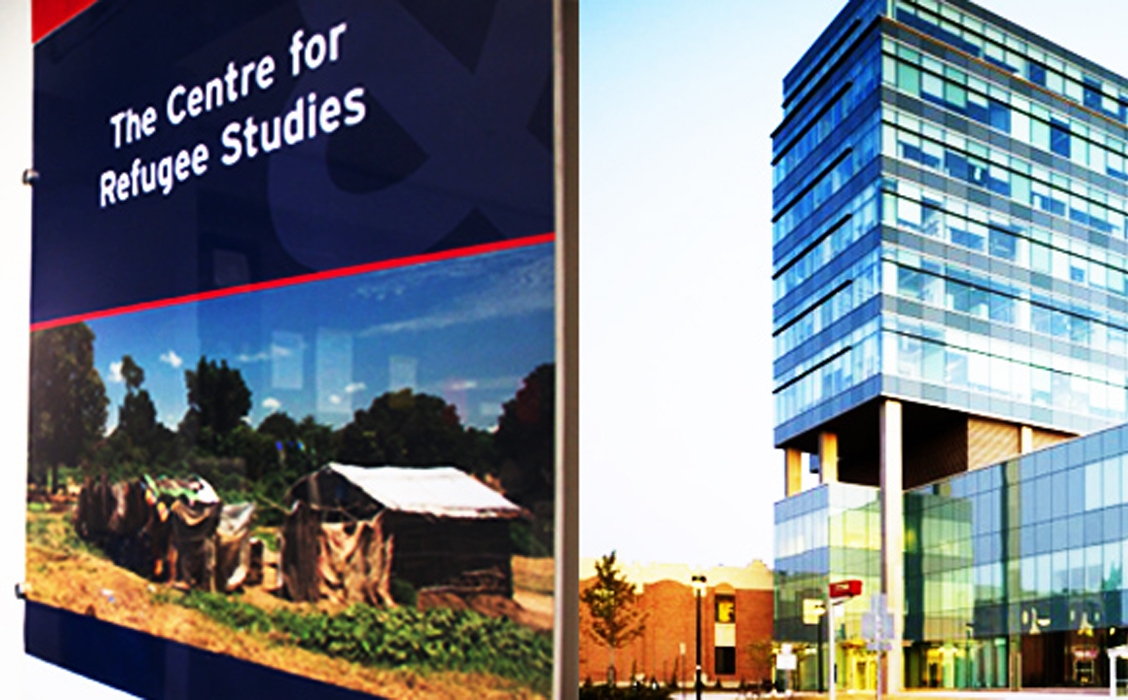Kanchi Uttamchandani | Assistant News Editor
Featured image: The Centre for Refugee Studies, located at the Kaneff Tower, is hosting the Syria Response and Refugee Initiative for 2016-2017. | Courtesy of York Media
York refugee sponsorship groups are facing delays in Canada’s refugee resettlement process, and some are becoming increasingly frustrated as the refugee crisis continues unabated.
“We are incredibly frustrated by the delay. Our team has lost momentum. Many of our members are students and some have graduated since this process began. The reason for this delay is unclear,” says Lesley Wood, sociology professor at York and project lead for one of the York fundraising teams, York University Sociologists and Friends.
Wood believes that even though the government met the target of resettling 25,000 Syrian refugees, they have pulled out the infrastructure to help more refugees come to Canada, despite the fact that many of them had already been matched and had support systems in place for their arrival.
“Like many other teams, we want the Canadian government to take its responsibility seriously to bring people in danger to safety. This shouldn’t only be for Syrians,” says Woods.
Wood’s team was matched with a Jordanian family who had lost multiple children in the war and desperately needed support.
“We were told they would most likely be in Toronto by the end of December. We obtained an apartment for them and stocked the kitchen with food. However, they haven’t arrived,” says Wood. The sponsored family are still stuck in challenging circumstances in Jordan, and cannot legally work or afford to eat.
Meanwhile, another York team, Students for Syrian Refugees, is awaiting the arrival of their sponsored family this fall.
“First, we are dealing with refugees who have been forced out of Homs, Syria, where 70 per cent of the housing has been destroyed. Similar destruction is happening in Aleppo,” says David Langille, social science course director and project lead for Students for Syrian Refugees.
“Second, as we search for housing for our refugee family, we are discovering first-hand the serious scarcity of affordable housing in the city. And much of that housing is plagued by cockroaches and bed bugs,” he adds.
Langille explains their team had to fundraise beyond the target so as to get decent housing for their sponsored family. He applauds the government’s refugee program, but believes bringing in refugees is just a small fraction of the work, which he refers to as a Band-Aid approach.
“We are not solving the root causes of the problems. We should not just blame the Syrian president, but also charge Presidents Obama and Putin for their war crimes,” claims Langille.
Kurdish Student Association president Alan Joseph shares similar views: “The Syrian conflict, which has spurred the worst refugee crisis since WW2, is emblematic of failing Western foreign policy.”
Joseph says the refugee camps where many of the families stay have become a hotspot for sexual violence and the recruitment of child soldiers by radical groups.
“It is incumbent on not just the Canadian government, but every country that has the capacity to resettle refugees to be more proactive. That includes Saudi Arabia and other wealthy Gulf nations,” says Joseph.
John Carlaw, Project Lead for Syria Response and Initiative at York, concurs. He states that 85 per cent of refugees reside in the Global South and that Western interventions have also contributed to instability in the Middle East.
“In this context, beyond our humanitarian impulses wealthy nations such as Canada have a duty to leverage the potential contributions of their citizens as effectively as possible,” he says.
Yet Carlaw maintains the government should be credited with helping to spark a major positive shift in the public discussion about refugees in Canada. “It should be noted that some of the frustrations have come from the good will on the part of sponsors that they helped to foster,” he says.
Carlaw says sponsors are appropriately outraged when they see their desire and material offers to help not being matched to the huge need for resettlement.
Jennifer Hyndman, director of Centre for Refugee Studies, believes it is vital to remember that privately sponsored refugees applying through Nairobi have to wait up to 70 months, as of September 2016.
She says 75 per cent of refugees are stuck for five years or more in conditions of long-term displacement.
“There really is an opportunity to engage thousands more Canadians in these efforts and the need for resettlement cannot be overstated in the context of long term conflicts and the lack of other durable solutions,” says Carlaw.
Hyndman believes Canada should increase both the intake of refugees and address its growing challenges simultaneously.
“Both sustainability and resettlement based on capacity is important. We need to evaluate how this wave of Syrian sponsorship goes and conduct research on what makes private sponsorship work,” she says.




